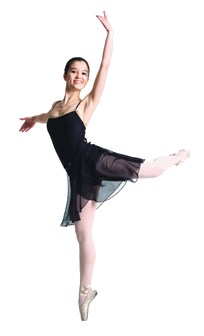|

The Value of Learning Ballet
Learning to dance can improve the condition of both body and mind at any age. Throughout history, sages have taught ways of coordinating the mental and the physical to provide balance in life. The English word "yoke" comes from the Sanskrit word "yoga," meaning the "yolking together" of mind and body. Ballet uses this same approach to move the dancer across the floor. Some might even say that it is the harmonious combination of mental and physical movements which makes any dancing beautiful.
The study of ballet provides physical benefits of all kinds, improving coordination, balance, dexterity, muscle tone, and agility. Anyone who doesn't already have a similar kind of practice can find great rewards in learning ballet. Studies have shown repeatedly that Americans, especially American children, as compared to those of other countries, do not get enough physical activity of any kind to keep them healthy in the long term. In this way, ballet classes are a kind of exercise routine. When you begin practicing ballet, your body will become progressively stronger, more flexible, and more durable.
In addition to the benefits for the physical body, the act of practicing ballet carries many more benefits for the mind. The focus and cooperation of the mind in dancing will improve concentration, discipline, creativity, perseverance, and more. It will cultivate the ability to stick to problems and to refine forms until they work fluidly and flawlessly. The act of dancing familiarizes the dancer with the process of cooperating with themselves to overcome their own limitations. The ability to refine oneself is perhaps the most critical skill needed in life.
A crucial addition to those benefits already mentioned is what psychologists call "flow." In the "yolking together" of mind and body, dancers will learn to express themselves in a coordinated, harmonious way in real time. Dancers can learn to "turn with the breeze," making rapid adjustments without a thought, keeping them in perfect balance with their surrounding environment. Herein lies the real value to any practice which harmonizes the mental and the physical: the ability to apply an highly refined sense of balance to life itself. All areas of activity can be improved with the proper "flow" of music and dance.
When a student learns, a student improves. Learning ballet at a young age will provide all the benefits mentioned above and will also give exposure to group participation and coordination. Taking ballet classes gives students the opportunity to cooperate with a group in the learning process and the challenge of becoming so familiar with each other and the routine that all students in the group move in the same way, at the same time. There is no better way to learn ballet than in a group, training under a professional teacher. This is how our dance studio is organised and we encourage you to investigate what you or your child may gain from learning ballet.
|









